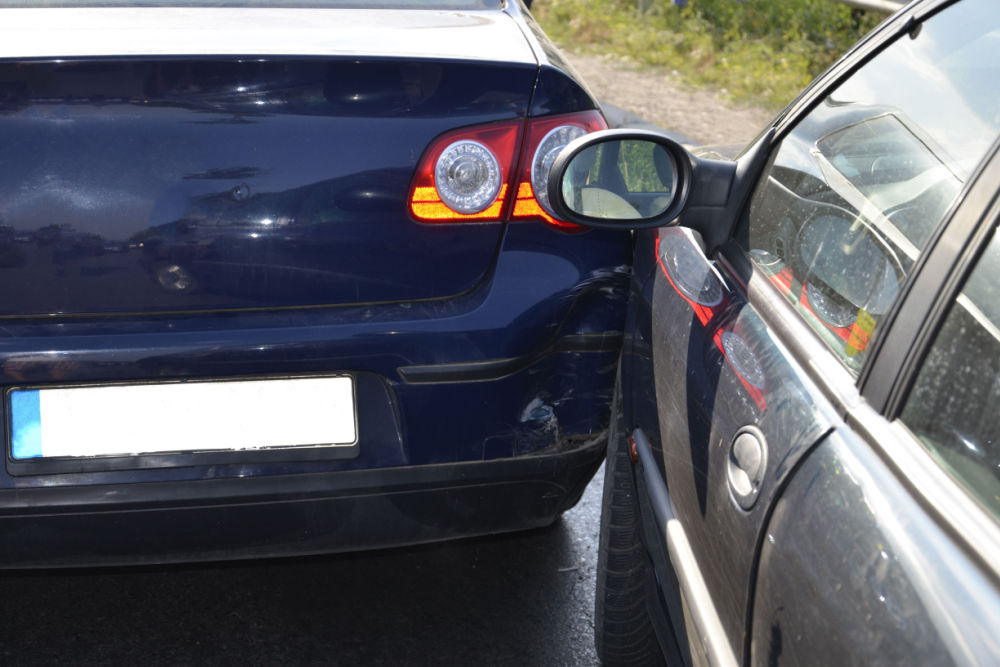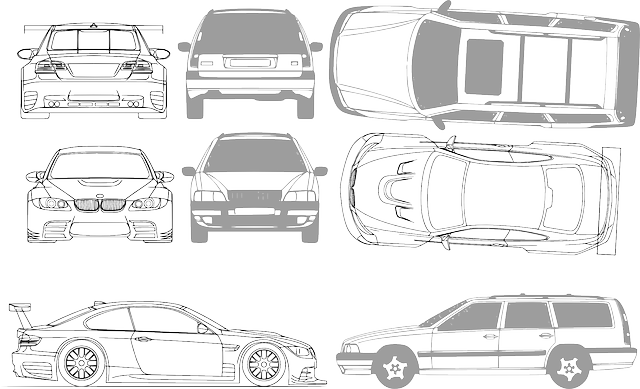What are Side Swipe Collisions?
"Side swipe car accident" collisions occur when two vehicles traveling in the same direction make contact with each other, typically along their sides. These types of when sideswipe accidents occur, can be particularly dangerous, as they often result in a loss of control and may lead to more severe collisions. Understanding the common causes and potential consequences of side swipe sideswipe car accidents however, is essential for preventing them and protecting yourself on the road.

Common Causes of Side Swipe Collisions
Distracted Driving
One of the leading causes of side swipe collisions is distracted driving. When distracted drivers can take their eyes off the road, they can drift into another lane, resulting in a side swipe accident. Common distractions include texting or talking on the phone, adjusting the radio, eating, or conversing with passengers.
Blind Spots
Blind spots are areas around a vehicle that the driver cannot see directly through their mirrors. When drivers fail to check their blind spots before changing lanes, they can lose control of smaller vehicle and may not notice a vehicle traveling next to them, causing a side swipe collision.
Improper Lane Changes
Improper lane changes are another major contributor to side swipe traffic accidents too. Failing to signal your intentions, cutting off another driver, or changing lanes without sufficient space can lead to side swipe collisions.

The Impact of Side Swipe Collisions
Physical Consequences
Side swipe collisions can result in a range of injuries, from minor to severe. Common injuries include whiplash, broken bones, internal injuries and head trauma. In some cases, side swipe accidents can lead to fatalities, particularly if negligent driver of vehicles involved in the crash involves the vehicle hits vehicles involved in car accident are traveling at high speeds.
Emotional and Psychological Effects
The emotional and psychological effects of a side swipe collision and personal injury from negligent driver can be severe injuries long-lasting. Victims suffered injuries may experience anxiety, fear, and even post-traumatic stress disorder (PTSD) after an accident occurs. These emotional effects suffer injuries can make it difficult for individuals to return to their normal lives and feel comfortable behind the wheel.
Financial Implications
The financial impact of a side swipe collision can be significant. Vehicle repairs, medical bills, and lost wages due to time off work can add up quickly. Additionally, insurance premiums may increase after an accident, further up medical bills and treatment expenses and straining the victim's finances.

How to Prevent Side Swipe Collisions
Defensive Driving Techniques
There are several defensive driving techniques that can help prevent side swipe collisions.
Regularly Checking Blind Spots
Always check your blind spots before changing lanes or merging onto a highway. Adjust your side mirrors to minimize blind spots, and consider installing blind spot mirrors for added visibility.
Proper Use of Turn Signals
Using turn signals alerts other drivers of your intentions to change lanes or merge. Always use your turn signals well in advance of making a lane change, and ensure they are functioning properly.
Maintaining a Safe Following Distance
Keeping a safe following distance allows small car behind you to react quickly to any sudden movements from other drivers. A good rule of thumb is to maintain at least one car length for every 10 mph of speed.

Dealing with a Side Swipe Collision
Steps to Take After an Accident
If you find yourself involved in a side swipe collision, follow these steps:
- Check for injuries and call for medical assistance if necessary.
- Move your vehicle to a safe location, if possible.
- Exchange information with the other driver(s) involved, including names, contact information, insurance details, and license plate numbers.
- Document the scene by taking photos and gathering witness statements.
- Contact your insurance company to report the accident.
Legal Considerations
In some cases, you may need to consult with a personal injury or car accident attorney to help you navigate the legal process after a side swipe collision. An experienced personal injury attorney experienced car accident attorney can help you a car accident attorney determine liability, negotiate with insurance companies, and make insurance claims to ensure you receive fair compensation for your injuries and damages.
Conclusion
Side swipe collisions and serious injuries can have lasting physical, emotional, legal liability, medical treatment, medical expenses, and financial impacts. Understanding the common causes and implementing defensive driving techniques can help prevent these accidents and keep you safe on the road. If you find yourself involved in a side swipe collision, remember to follow the appropriate steps to protect your rights and interests.

FAQs
1. What is a side swipe collision?
A side swipe collision occurs when two vehicles traveling in the same direction make contact with each other, doing significant damage to other vehicles, typically along their sides.
2. What are the most common causes of side swipe collisions?
The most common causes of side swipe collisions are distracted driving, blind spots, and improper lane changes.
3. How can I prevent side swipe collisions?
Practicing defensive driving techniques, such as regularly checking blind spots, using turn signals, and maintaining a safe following distance, can help prevent side swipe collisions.
4. What should I do if I'm involved in a side swipe collision?
After a side swipe collision, check for injuries, move your vehicle to a safe location, exchange information with the police report the other driver(s), document the full accident report on the accident scene, and contact the police report your insurance company.
5. Do I need a lawyer after a side swipe collision?
In some cases, you may need a personal injury attorney to help you navigate the legal process after a side swipe collision, particularly if there are disputes over liability for vehicle and property or vehicle damage alone, or you an a personal injury claim would require significant compensation for injuries and damages.
The Role of Technology in Preventing Side Swipe Collisions
Advancements in vehicle technology have led to the development of safety features parked vehicles that can help prevent side swipe collisions. These features work by assisting drivers in maintaining safe distances, staying in their lanes, and monitoring blind spots.
Adaptive Cruise Control
Adaptive cruise control (ACC) is a system that automatically adjusts a vehicle's speed to maintain a safe following distance from the vehicle ahead. By using sensors and cameras, ACC can reduce the risk of side swipe collisions caused by tailgating or sudden lane changes.
Lane Departure Warning and Lane Keeping Assist
Lane keep same lane departure warning systems alert drivers when their vehicle begins to drift out of its lane, either by sounding an alarm or providing visual cues. Lane keeping assist systems take this a step further by actively steering the vehicle back into its own lane, when it detects an unintentional lane departure. Both of these systems can help prevent side swipe collisions caused by drifting into another lane.
Blind Spot Monitoring
Blind spot monitoring systems use sensors to detect vehicles in a driver's blind spot accidents other spots and provide alerts, usually through a warning light on the side mirrors or an audible alert. This technology can significantly reduce the risk of side swipe collisions by ensuring drivers are aware of other lanes and vehicles being in their blind spots before changing lanes.
The Importance of Driver Education and Awareness
While technology can play a vital role in preventing side swipe collisions, it is essential for drivers to remain educated and aware of the risks and best practices for safe driving. Regular driver education and training can help reinforce defensive driving techniques at fault driver, and ensure that drivers are up-to-date on the latest safety features in their vehicles.

Driver Education Programs
Driver education programs, whether for new drivers or as a refresher for experienced drivers, can provide valuable instruction on safe driving habits and techniques. These programs often cover topics such as maintaining safe following distances, checking blind spots, and using turn signals properly.
Awareness Campaigns
Public awareness campaigns, such as those led by government agencies or non-profit organizations, can help raise awareness about the dangers of side swipe collisions and the importance of safe driving habits. These campaigns often use a combination of advertising, social media, and community events to reach a broad audience and encourage safer driving behaviors.
By staying informed and utilizing the latest technology, drivers can significantly up highway safety and reduce their risk of being involved in an accident occurs a side swipe collision. Regular driver education and public awareness campaigns can further reinforce safe driving habits and contribute to safer roads for everyone.
The Role of Road Infrastructure in Preventing Side Swipe Collisions
Road infrastructure plays a crucial role in preventing side swipe collisions. By designing roads that encourage safe driving behavior and incorporating features that minimize confusion and miscommunication among the two drivers below, it is possible to reduce the occurrence of side swipe collisions.
Clear Lane Markings
Properly maintained and visible lane markings are essential for preventing side swipe collisions. Clear lane markings help drivers stay in their lanes and facilitate smooth and safe lane changes. Regular maintenance and repainting of lane markings can significantly contribute to reducing side swipe car accidents too.
Proper road signage helps inform drivers of upcoming lane merges, exit ramps, and road conditions that may require lane changes. Adequate signage can prevent confusion and give drivers enough time to prepare for necessary lane changes, reducing the risk of sudden and unsafe movements that can lead to side swipe collisions.

Road Design and Engineering
The design and engineering of roadways can also impact the likelihood of side swipe collisions. Incorporating features such as wider lanes, designated merging areas, and adequate space for acceleration and deceleration can help drivers maneuver more safely and reduce the risk of side swipe accidents.

